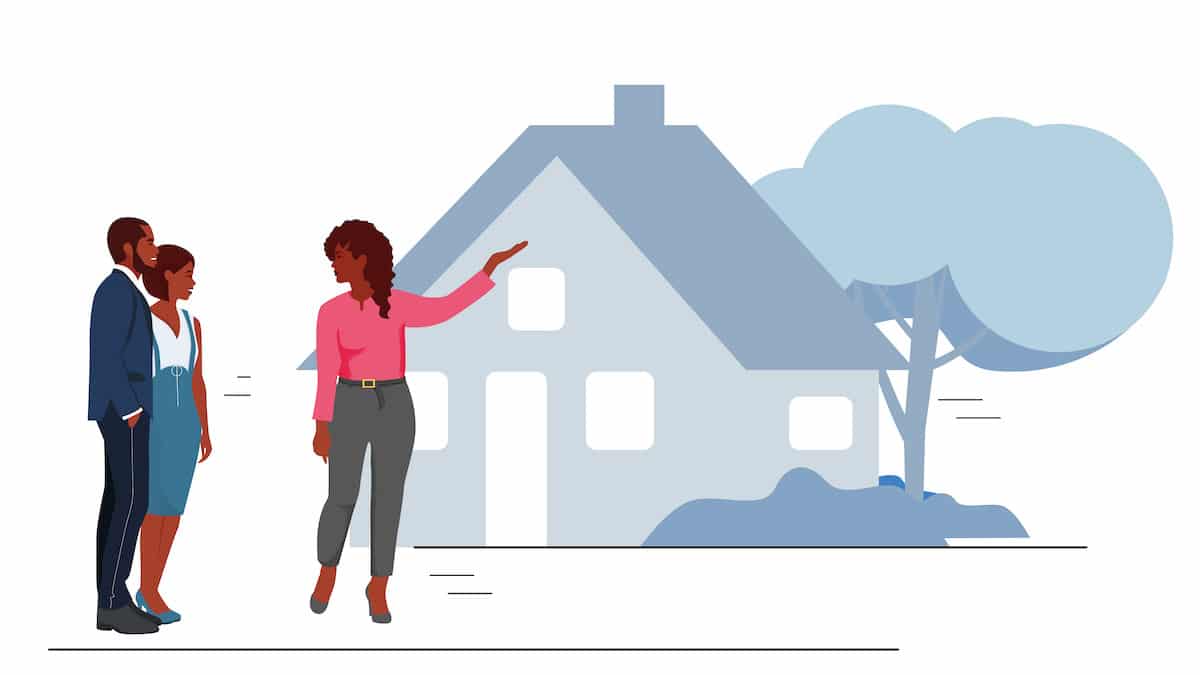
Published
Do I need an agent? | Responsibilities | Types of agents | Agent vs. realtor | FAQs
A real estate agent holds a specialized license from their state that allows them to represent buyers and sellers in real estate transactions.
Some residential real estate agents work exclusively with either home buyers or sellers — but most do both.
All real estate agents need to work with a brokerage — a company that oversees transactions and ensures agents are compliant with state law.
Agents typically earn commission — a percentage of the home’s sale price — when they close a deal. Most agents charge 2.5–3% commission to represent a seller.
Real estate agent qualifications
- Pre-licensing education
- Passing grade on real estate salesperson’s licensing exam
- A sponsoring broker
Do I need a real estate agent?
You aren’t technically required to have an agent when you buy or sell a home, but working with an agent is usually the best decision if you want to avoid messing up one of the largest transactions of your life.
Real estate agents have years of experience and training that will be advantageous when you’re navigating one of the biggest transactions of your life.
For sellers, agents are able to price a home competitively, evaluate what repairs are necessary, and negotiate with buyers when offers come in.
For buyers, agents can find properties that fit the buyer’s budget, negotiate with the seller to get a good deal, and finalize all of the details before closing.
Either way, the experience and support of an agent will help you to get a much better deal than if you’re working alone.
» READ: How to Find a Real Estate Agent: What You NEED to Know.
Benefits of working with an agent
| Buyers | Sellers |
|---|---|
| Quickly find properties that match your budget and preferences | Determine the best listing price for your home |
| Get help preparing offers, such as what contingencies to include | Get advice about what repairs are necessary and how quickly your home may sell |
| Have a professional in your corner when it's time to negotiate | Have a professional in your corner when it's time to negotiate |
| Get help coordinating details before closing | Get help communicating with all of the parties involved prior to closing |
Should I buy or sell without an agent?
Working without a real estate agent means you have to do all of the legwork yourself. You’ll have to rely on your own limited knowledge and experience in real estate, leaving a lot more room for something to go wrong.
With the exception of people who have years of experience working in real estate, it’s best for most buyers and sellers to work with an agent. You’ll have to pay your real estate agent’s commission, but it’s usually worth it.
For buyers, your agent’s commission comes out of the proceeds of the sale, so there’s no out-of-pocket cost to you.
For sellers, the listing agent takes a percentage of your proceeds to pay themselves and the buyer’s agent, but they’ll probably help you to sell faster and for more money than if you sold for sale by owner (FSBO) — effectively cancelling out the cost of their commission.
What do real estate agents do?
The responsibilities of a real estate agent vary depending on their role.
Some real estate agents specialize in representing either buyers or sellers, but most agents work with both, depending on who contacts them.
Types of real estate agents
| Type of agent | Description |
|---|---|
| Listing agent | Helps home sellers list and market their home to prospective buyers |
| Selling agent/buyer's agent | Helps home buyers find homes, submit offers, and negotiate terms |
| Dual agent | Represents both the buyer and seller in a single transaction |
| Transaction agent | Acts as a mediator between the buyer and seller, but doesn’t represent either of them |
What do real estate agents do for sellers?
- Give pricing advice — Your listing agent will provide you with recent sales data from comparable homes in your area to determine an accurate asking price.
- List the house on the MLS — The Multiple Listing Service is used by all real estate agents to share details about homes that are for sale. Your agent will take pictures, gather information about your house, and then create a listing on the MLS.
- Coordinate showings — As inquiries come in, your listing agent will schedule times for prospective buyers to come tour the property.
- Review offers and negotiate with buyers — The agent can explain an offer from a potential buyer and help the seller determine if they want to accept it. The agent will also negotiate on the seller’s behalf if they want to make a counter offer.
- Manage communication between parties — Your listing agent will act as the go-between to communicate with the buyer’s agent, and any other parties involved in the sale.
- Attend inspection/final walkthrough — A good listing agent will attend the home inspection and final walkthrough with you to make sure that the buyer/buyer’s agent is negotiating honestly.
- Handle paperwork — The listing agent makes sure that all parties involved have the right information to execute the deal by closing day.
What do real estate agents do for buyers?
- Identify properties that meet the buyer’s needs — Once the agent knows the buyer’s preferences and budget, they’ll start finding properties that might suit the buyer.
- Show houses to the buyer — The agent can help the buyer get access to homes they’re interested in and give them tours.
- Get follow up information from the seller — After a buyer views a house, they might have more questions about it. The agent can follow up with the seller/the seller’s agent to find out more.
- Prepare offers on the buyer’s behalf — When a buyer likes a home, their agent can draw up an offer that includes the price they’re willing to pay, contingencies of the offer, and other relevant information.
- Negotiate with the seller — The seller might accept the offer or ask for a counter offer. The agent can negotiate on the buyer’s behalf until both parties reach an agreement.
- Attend the inspection — The buyer’s agent can watch as the home inspector checks out the house — giving them the opportunity to ask questions and learn even more about the home’s condition.
- Manage details prior to closing — Once the offer is accepted, the buyer’s agent needs to make sure all of the contingencies in the offer are met and the buyer’s financing is in order before closing.
- Check in on the appraisal — The appraisal is used to qualify the buyer for a mortgage. The buyer’s agent can make sure that the appraiser didn’t miss anything when they were looking at the property.
- Attend the final walkthrough — A buyer’s agent can attend the final walkthrough with the buyer to make sure that everything has been repaired and/or left in the condition that was agreed to in the purchase agreement.
Real estate agent vs. REALTOR
The titles “real estate agent” and “realtor” are often used interchangeably, but a REALTOR (all caps) is an agent who is a member of the National Association of REALTORS (NAR).
» MORE: Realtor vs. Real Estate Agent — What’s the Difference?
Real estate agents aren’t required to become NAR members, but many of them are. NAR membership comes with opportunities for continuing education and career development, and it’s a designation that agents can use to market themselves to new customers.
Ready to find your agent?
FAQs about real estate agents
What do real estate agents do?
Real estate agents represent home buyers and sellers. Their responsibilities include things like pricing homes, negotiating, and managing closing.
For sellers, agents are able to price a home competitively, evaluate what repairs are necessary, and negotiate with buyers when offers come in.
For buyers, agents can find properties that fit the buyer's budget, negotiate with the seller to get a good deal, and finalize all of the details before closing.
Do I need a real estate agent?
Real estate agents are highly recommended when you buy or sell a house because they have the experience and expertise to ensure you get the best deal possible.
If you're worried about paying commission, there are some great low commission real estate companies that can help you save money while still providing professional service.
Further reading
Want to learn more about how real estate agents get paid, what you need to know about selling a house, and ways to save money when you’re ready to sell? Check out these awesome resources!
What Companies Offer the Lowest Real Estate Commission Fees? Discover the best low commission real estate companies. Includes detailed reviews and comparisons!
How Much Do Real Estate Agents Make? Agents get paid commission each time they buy or sell a house, but with commission splitting and expenses, how much they actually make might be less than you think.
What Is a Listing Agreement? A listing agreement is a legally binding agreement that sellers sign with an agent when they’re ready to list their home — but there are different types. Find out how to read a listing agreement before you sign one.
The Role of the Real Estate Agent. When a home is sold, there are a lot of people involved. Learn more about what agents do and how their job fits into the picture.


Leave a Reply